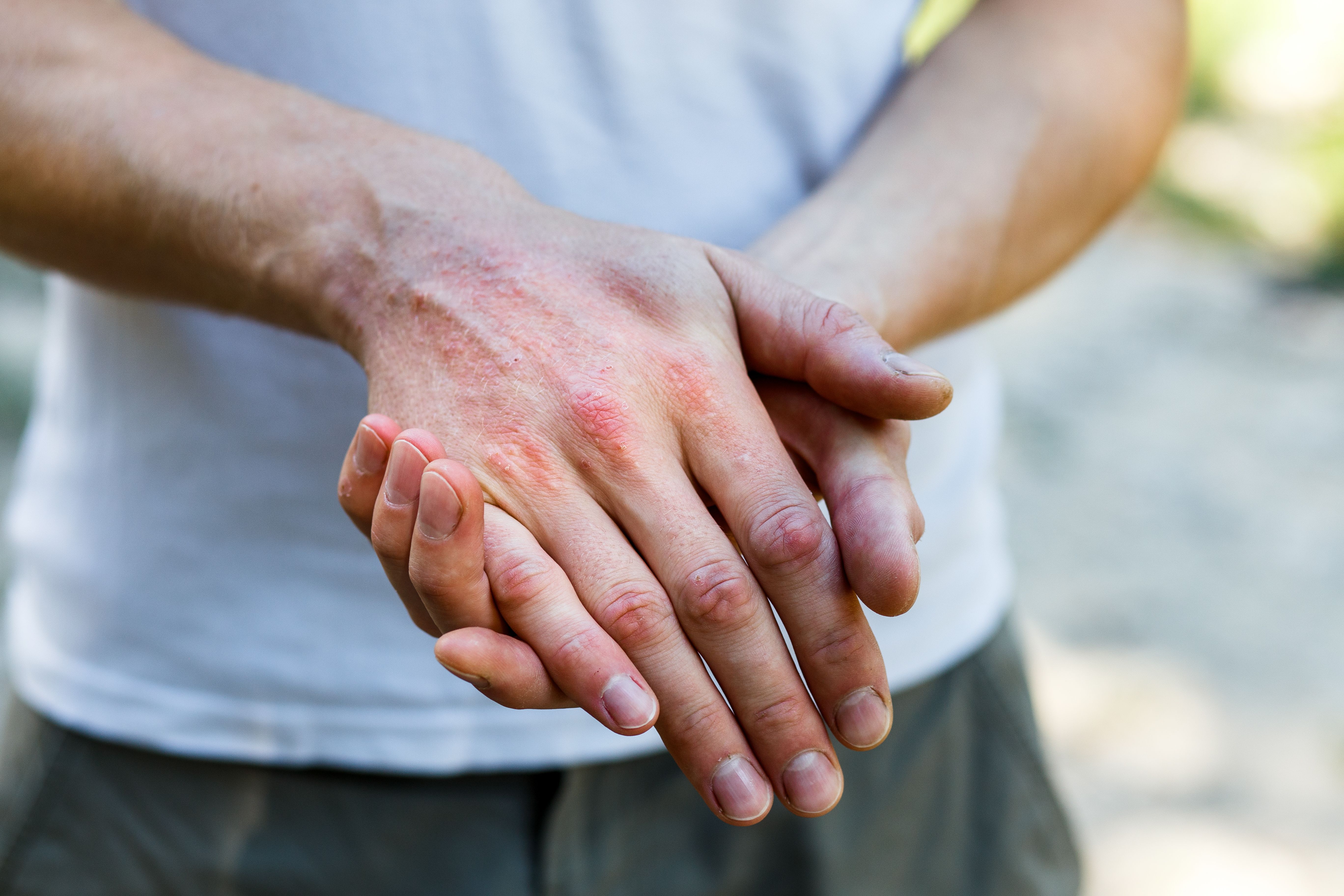- Case-Based Roundtable
- General Dermatology
- Eczema
- Chronic Hand Eczema
- Alopecia
- Aesthetics
- Vitiligo
- COVID-19
- Actinic Keratosis
- Precision Medicine and Biologics
- Rare Disease
- Wound Care
- Rosacea
- Psoriasis
- Psoriatic Arthritis
- Atopic Dermatitis
- Melasma
- NP and PA
- Skin Cancer
- Hidradenitis Suppurativa
- Drug Watch
- Pigmentary Disorders
- Acne
- Pediatric Dermatology
- Practice Management
- Prurigo Nodularis
- Buy-and-Bill
News
Article
Late-Breaker: Positive 52-week Data for Rademikibart in Patients with AD
Author(s):
The data, presented at RAVE 2024, continued a positive trend, building upon strong phase 1 results of rademikibart for patients with AD.
Image Credit: © Ольга Тернавская

A late-breaking session at the 2024 Revolutionizing Alopecia Areata, Vitiligo, and Eczema Conference in Chicago, Illinois, shared positive data out of China from a phase 2, 52-week trial of rademikibart in patients with moderate-to-severe atopic dermatitis(AD) (SEASIDE CHINA or CN002; NCT05017480).1
Previously, Connect Biopharma announced positive data from the 36-week marker in the trial. The company noted results were consistent with phase 1 findings, wherein rademikibart met all primary and secondary endpoints.2
At the time of the 36-week data release, Christopher Bunick, MD, PhD, a Dermatology Times Editorial Advisory Board member and associate professor of dermatology and physician-scientist at the Yale School of Medicine in New Haven, said, “Rademikibart really distinguished itself among the AD biologics with >80% of patients maintaining both IGA 0/1 and EASI-75 with q4 week dosing, over 10 points better than the next closest biologic. This suggests rademikibart has best in class potential for AD biologics with monthly dosing."
Bunick went on to say dermatologists could expect to hear further phase 2b data on rademikibart across similar indications that dupilumab is approved for. Sixteen weeks further into the long-term study, Zhang et al confirmed the 52-week results continue to build on the strong data formerly reported.
Background
During phase 1 of the study, adults (n=318) and adolescents (n=12) were randomized (2:1) to take 300 mg Q2W rademikibart or placebo for 16 weeks. The study reported this group of patients as having a mean Investigator Global Assessment (IGA) of 3 or greater, Eczema Area and Severity Index (EASI) of 16 or higher, Body Surface Area (BSA) of 10% or more and Peak Pruritus Numerical Rating Scale (PP-NRS) of 4 or higher.3
For phase 2, researchers reported that EASI-50 responders, regardless of stage 1 treatment, were re-randomized to Q2W (n=113) or Q4W rademikibart (n=112). Non-responding patients were assigned open-label Q2W rademikibart (n=86).
Results
The initial baseline mean EASI was found to be 29.3 (range, 16.0 to 72.0) with 54.7% IGA4 for stage 1 responders. For non-responders, researchers reported a baseline mean EASI of 23.7 (16.0 to 66.6) with 51.2% IGA4. Of patients who achieved IGA 0/1, researchers found 76% (Q2W) and 87.2% (Q4W) maintained their response at week 52. Similarly, they reported 91.7% (Q2W) and 91.9% (Q4W) of patients maintained their EASI-75 response. From week 16 to week 52, they observed28.2% (Q2W/Q2W; n=91) and 20.8% (Q2W/Q4W; n=91) additional patients achieved IGA 0/1. Researchers also reported that during this time, 16.3% (Q2W/Q4W) and 11% (Q2W/Q4W) additional patients achieved EASI-75.
The study found that out of all patients with a 4-point and greater reduction in PP-NRS, 81.6% (Q2W) and 95.2% (Q4W)maintained their response at week 52. A 5-point and greater reduction on the Dermatology Life Quality Index (DLQI) was reported to be maintained by 93.4% (Q2W) and 90% (Q4W) of patients. For 26 of the rademikibart non-responders (stage1), EASI scores improved by 45% with 51.4% achieving EASI-75 by week 52. They reported that overall, rademikibart treatment was generally well tolerated.
Conclusion
In this study, the researchers made note that the maintenance data with rademikibart is “compelling and build[s] upon strong results shown in stage 1.” They reported observing high rates of maintained efficacy with Q4W dosing, additional gains in efficacy with continued treatment, and maintenance of clinically meaningful changes in pruritis and quality of life.
References
- Zhang J, Silverberg JI, Guo J, et al. Positive 52-week maintenance data observed with rademikibart in patients with moderate-to-severe atopic dermatitis (SEASIDE CHINA). Poster presented at: 2024 Revolutionizing Alopecia Areata, Vitiligo, and Eczema Conference; June 8-10, 2024; Chicago, IL.
- Connect Biopharma Holdings Limited. Connect Biopharma announces positive long-term data from the China pivotal trial of rademikibart in patients with moderate-to-severe atopic dermatitis.News release. Globe Newswire News Room. November 21, 2023. Accessed June, 11, 2024. https://www.globenewswire.com/news-release/2023/11/21/2783837/0/en/Connect-Biopharma-Announces-Positive-Long-Term-Data-from-the-China-Pivotal-Trial-of-Rademikibart-in-Patients-with-Moderate-to-Severe-Atopic-Dermatitis.html
- Zhang J, Silverberg JI, Li P, et al. CBP-201, a next-generation IL-4Rα antibody, achieved all primary and secondary efficacy endpoints, with a favorable safety profile, in adults with moderate-to-severe atopic dermatitis (AD): A randomized, double-blind, pivotal trial in China (CBP-201-CN002). Oral presentation #45874, 2023 Annual Meeting of the American Academy of Dermatology (AAD 2023); New Orleans, LA, USA.






